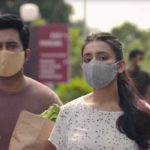As COVID-19 spread across the world, Apple has redirected RED proceeds toward the Response Mechanism and will continue to do so until 30 June 2021
At a sprawling warehouse in Lusaka, a truck has been loaded with boxes of lifesaving antiretrovirals and begins a two-hour drive west out of Zambia’s capital city. It’s on its way to a rural health clinic in Mwembeshi, and today there are additions to its usual cargo: boxes of face masks and face shields from Apple to help in the fight against COVID-19.
This year, COVID-19 drastically changed the landscape of healthcare, and the Global Fund, which coordinates these shipments to help fight AIDS, tuberculosis, and malaria, had to react quickly to respond to this second pandemic. It established the COVID-19 Response Mechanism, which is adapting existing Global Fund programs so that people receiving lifesaving treatments, including lifelong antiretroviral therapy, can continue to do so safely.
Apple company began working with (RED) in 2006 and has launched dozens of products and accessories through the campaign, including the latest iPhone 12 and iPhone SE RED models. As a result of those sales, Apple and its customers have raised almost US$250m/£187m toward the Global Fund’s efforts in sub-Saharan Africa.
As COVID-19 spread across the world, Apple redirected RED proceeds toward the Response Mechanism and will continue to do so until 30 June 2021. Apple also donated millions of units of personal protective equipment (PPE) to the Ministry of Health in Zambia. That includes both surgical face masks Apple sourced from its supply chain as well as face shields designed and produced by Apple.
Back at the Mwembeshi Rural Health Centre, the truck ladened with antiretrovirals and Apple PPE has arrived and is met by staff including Prosperina Mwanza, who runs the clinic.
“This provision of PPE will go a long way in cutting the transmission of infections,” says Mwanza, who has seen COVID-19 severely impact her clinic, especially for the HIV patients receiving antiretroviral treatment. “The biggest challenge right now is that people stopped coming for follow-ups because they felt they would interact with people that had COVID-19.”
It’s a challenge that medical professionals are facing across Zambia and sub-Saharan Africa. Yoram Siame is head of Advocacy, Planning, and Development with the Churches Health Association of Zambia (CHAZ), the largest nongovernmental health provider in the country.
“People are now afraid to go to health facilities,” says Siame. “This is a very big issue for people living with HIV because when you talk about COVID-19, it disproportionately kills people with preexisting conditions. So how do you ensure that people on lifelong treatment are supported? At the same time, how do they come to a health facility with an assurance that they are safe? So it’s a bit of a difficult balancing act.”
The Global Fund answered by adapting its health services to secure rapid quality COVID-19 testing and diagnostic equipment, scale-up treatment delivery to local communities, and provide health-safety education tools for community health workers.
“The Global Fund has been a game-changer,” says Siame. “We were able to repurpose some of the money for personal protective gear for health workers, we ramped up our [COVID-19] testing capacity, and we were able to respond at a community level to make people understand what COVID-19 meant for them and their families.”
Thirty miles east of Mwembeshi, Cardinal Adam Memorial Hospital received its first shipment of Apple PPE a few weeks ago. Samson Tembo is a retired military officer who has been the hospital’s HIV program coordinator for the past two years. “The PPE is very important because physically it helps protect workers and mentally it helps us do our jobs freely,” says Tembo.
As the COVID-19 pandemic progressed, he was forced to adapt his treatment plans because many of his patients were staying home.
“We had to give drugs to patients for longer periods of time than usual so that people didn’t have to come to the facility as often,” says Tembo. “Because of that, we do not know whether they are taking the drugs correctly in terms of adherence. As a clinician, I need to know how they are doing out there, so if I don’t see them regularly, it becomes a bit of a problem.”
“With disrupters like COVID-19, we know that we will still have to do a lot of work to ensure that we get to that point. But I think COVID-19 has been proof of the [Global Fund’s] capacity to adapt to changing circumstances,” a comment made by Prosperina Mwanza, Mwembeshi Rural Health Centre.



Average Rating